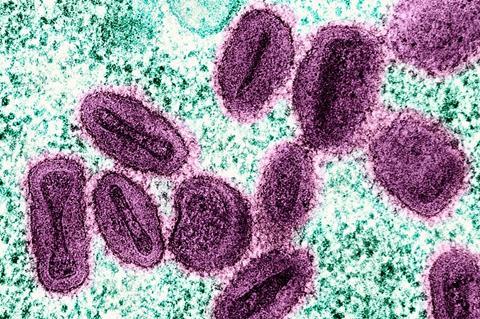Vaccinating children under five-years-old in endemic mpox regions in the Democratic Republic of the Congo (DRC) would significantly reduce the number of deaths in the country, according to a new analysis by researchers at the Yale School of Public Health.

READ MORE: Mpox vaccine is safe and generates a robust antibody response in adolescents
READ MORE: Study shows Mpox (monkeypox) antibodies wane within a year of vaccination
The study, led by Gregg Gonsalves, PhD, associate professor of epidemiology at the Yale School of Public Health (YSPH), and Alexandra Savinkina, a fourth year PhD student in the Department of Epidemiology (Microbial Diseases) at YSPH, modeled different mpox vaccination strategies in the DRC to see which one was most effective.
Mpox is spreading at an alarming rate
Mpox is an infectious disease caused by the monkeypox virus. It was first identified in the DRC in 1970, with an unprecedented large outbreak occurring in 2023.
Health officials say the virus is currently spreading at an alarming rate. More than 14,000 cases and 700 deaths from mpox occurred in the DRC in 2023, with 70% of those cases diagnosed in children. So far in 2024, Congolese authorities have reported more than 31,000 suspected cases and nearly 1,000 deaths. But researchers suspect the actual total case number is much higher as mpox is largely underreported in the DRC, with only an estimated 41% of cases being documented.
On August 14, 2024, the World Health Organization declared the current DRC mpox outbreak a Public Health Emergency of International Concern, its highest level of global alert.
In the Yale study, researchers created a mathematical model to identify effective vaccination strategies for mpox in the DRC. The study analyzed multiple hypothetical scenarios where the modeled vaccination strategy would have been completed prior to the 2023 outbreak.
“This is the first analysis looking at mpox vaccination scenarios in the DRC in the context of the current outbreak,” Savinkina said. “My hope is that it could help inform policy for vaccination in the country and potentially the region and move the needle forward on getting vaccines to the people who need them most in the DRC.”
Vaccinating children under five in endemic areas would be most effective
This study simulated how different vaccination campaigns could be rolled out in the DRC to prevent mpox cases and deaths. The model predicted that if 10.5 million vaccine doses were delivered to 80% of children under five years of age in regions where the virus was endemic or widespread, there would have been a 27% reduction in cases and a 43% reduction in deaths.
Vaccinating 80% of children younger than five years in all regions would result in a 29% reduction in cases and a 43% reduction in deaths but would require 33.1 million doses. Vaccinating 80% of children aged 15 years or younger in endemic provinces would have a greater impact, reducing cases by 54% and deaths by 71%, but would require 26.6 million doses.
Considering vaccine impact and implementation, the model showed that vaccinating children aged five years and younger in endemic regions would be most efficient and effective, providing the greatest benefit with a minimum number of doses.
Although vaccines for mpox are available, access to those life-saving doses has been extremely limited in the DRC.
Not known how many years mpox vaccine lasts
The modified vaccinia Ankara vaccine (brand names JYNNEOS, Imvamune, and Imvanex) was widely used during a 2022 mpox outbreak in the U.S. and Europe. However, these vaccinations have not been made available in the DRC. The JYNNEOS vaccine is up to 87% protective in those who are not immuno-compromised.
“I hope we can learn from the global mpox outbreak that we can’t ignore disease in other places far from our shores,” Savinkina said. “If the resources to help people exist, I think we should be using them, whether in the U.S. or in Africa.”
There are also concerns about vaccine delivery in the DRC, as many areas are rural and a national distribution network is lacking.
“We take for granted that we can get a vaccination at our local CVS and get our COVID or flu shots,” Gonsalves said. “The infrastructure to deliver vaccines in the DRC is far less robust.”
The Yale study had some limitations as the model considered just a single-year period in its simulations. Data is also sparse on the potency of the mpox vaccine. It is not yet known how many years the protection of one dose will last, although health officials hope protection will extend for decades, similar to the smallpox vaccine. This would be extremely beneficial in the DRC where delivering multiple vaccine doses to isolated rural areas can be a challenge.
Gonsalves and Savinkina said they hope their study will encourage global action to provide the DRC with life-saving vaccines to help stem the current outbreak, which is devasting the country, particularly its children.







No comments yet